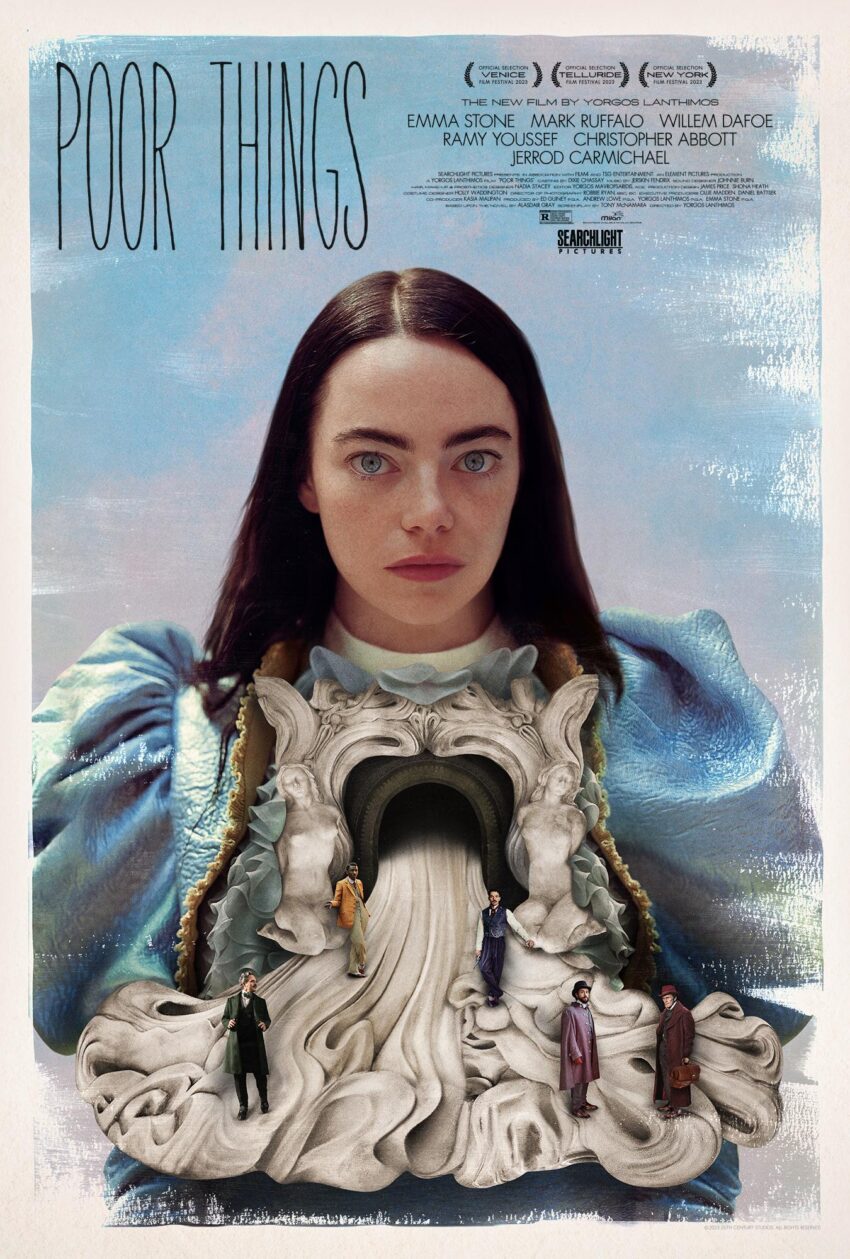Poor Things
By: Julz Levesque, Staff Writer

The film Poor Things was highly anticipated and generated buzz before and after its initial release in American theaters on December 8th, 2023. The film racked up $117 million at the box office and was one of the top contenders during awards season this year. It won five BAFTAs, one Critics Choice Award with Emma Stone winning for the Best Actress category, two Golden Globes, two Satellite awards, and four Academy Awards, with many other wins and nominations following behind. Poor Things held a good chance in competition with other films such as Oppenheimer, which it was second to in nominations for the Oscars; Along with Barbie and Killers of the Flower Moon. Months after its release, the film joined Hulu on March 7th, 2024, which allowed viewers to watch from the comfort of their own homes. The director for Poor Things, Yorgos Lanthimos, might be a familiar name as he directed other films such as The Favorite (2018), The Lobster (2015), and The Killing of a Sacred Deer (2017). Lanthimos is set to be directing an upcoming film, Kinds of Kindness, which features some faces from Poor Things in the cast, including Emma Stone, Willem Dafoe, and Margaret Qualley. Poor Things holds a 79% on Rotten Tomatoes, 7.9/10 on IMDb, and a 4.1 rating on Letterboxd.
The film takes place in what seems like the 1800s and follows a brief glimpse into the life of a woman named Bella Baxter (Emma Stone) after her death and rebirth. A doctor and scientist known as “God” or Godwin Baxter (Willem Dafoe) takes her in after her successful suicide to further experiment on her body. Bella was with child, but during the experimentation, Godwin removed her child’s brain and placed it in her head, creating Bella, who had the anatomy of a grown woman but the mind of an infant. As she lives in the custody of God, she begins to learn about life all around her as he studies how her mind functions, how she interacts with the world, as well as her accelerated progress in brain capacity and motor function. God then hires an assistant Max McCandles (Ramy Youssef) to take on this responsibility and he begins to study, take notes, and spend time with her. He begins to develop an affinity to Bella and a plan develops where Bella is to marry McCandles. However, the comical Duncan Wedderburn (Mark Ruffalo) steps in and shows her the life away from being trapped by her creator and her fiance. He aims to show her liberation from the oppression of polite society. They both go away to Lisbon on a vacation with the promise to go back but this shows not to be the case as Bella wanders around, enriching herself and therefore learns more about what she wants and how she views the world. She becomes more difficult for Duncan to control and she no longer fits into the mold he’s created for her. He attempts to force “polite society” rules on her that he once claimed to refuse. As she pushes him away and declines his manipulation into socialization he further traps her on a boat to another location. They’re later thrown off the boat after their funds run out and end up without shelter in Marseille. Eventually, Bella reveals she has had an emergency fund hidden in her dress and he takes it, leaving her. She begins to work at a brothel to make money and gain more experience in life by experimenting and learning about the world around her.
It’s a story that is so multi-faceted with coming-of-age themes, comedic lines, and thrilling/horrific scenes. Bella is placed as the Frankenstein of the story. She is looked at by every man around her as a woman who is easily impressionable but quickly grows to be a monster to them when she develops desires and opinions that are often at their expense. It was clear the creator was the monster of the story, taking away the right to her decision of ending her life amidst his selfish desire to nonconsensually experiment on her to further his own research. The rest of the men who took advantage of her throughout the film were also the monsters of the story by projecting their fantasies onto her, controlling her, and continuously attempting to strip her of her autonomy. In my personal opinion, I felt that the message of the film was objectively surface-level and was easily understandable, but what I did admire was their approach to the topic of misogyny and patriarchal norms in a way that was refreshing and unique. The film is full of wit with great on-screen chemistry during the comedic bits. Emma Stone did a magnificent job in portraying a young mind placed in the claws of predators and gradually descending into the anger that comes with growing weary of the oppressive and patriarchal world around you. Mark Ruffalo did an excellent job at portraying a pathetic man. Apart from the plot and the performances, the film itself is visually stunning to look at. The look of the set design I can only describe as surrealist, and many of the scenes reminded me of artworks from Salvador Dali and Hieronymus Bosch. Some of the landscapes were reminiscent of the work The Garden of Earthly Delights. The set blended both Victorian styles with a dash of steampunk. With the various fish-eye lens shots, and black and white scenes contrasting the rich and luxurious colors it was truly a visual treat. I enjoyed the film, but I do not recommend seeing it with family members as there are various sex scenes throughout with full-frontal nudity. Although there were many scenes like this, I felt it suited the film somewhat well as it was obvious that they were not supposed to be visually pleasing but rather something to find ridiculous and even repulsive.
I do recommend the film, but I will say not everyone will enjoy it. At times it could be regarded as vulgar, but I felt it was more avant-garde and made the message of the film far more engaging and thought-provoking. I definitely enjoyed it and felt that it did well at creating an atmosphere that was witty but didn’t shy away from difficult subjects. Bella Baxter was such a fascinating and admirable protagonist. “I’m a flawed, experimenting person, and I will need a husband with a more forgiving disposition.”

